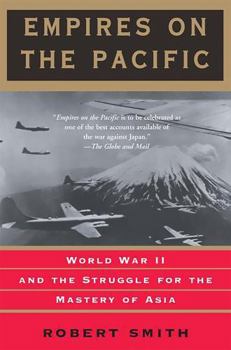Empires on the Pacific
Select Format
Select Condition 
Book Overview
By moving China to center stage, Robert Smith Thompson expands the traditional boundaries of the Pacific Theater of World War II and casts the conflict in an entirely new light. What is commonly viewed as a discrete military conflict between an aggressive Japan with imperial ambitions and a reluctant, passive America now becomes the stuff of Greek tragedy. The overreaching British Empire is waning, yet is unwilling to relinquish its foothold in China, while an increasingly ambitious Japan is determined to dominate the region and conquer China as part of that plan. Enter the young upstart, America, with imperial ambitions of its own in Asia. The United States meant to replace Britain as the dominant power in Asia and saw Japan as a direct threat to that dominance. For Franklin Delano Roosevelt and for the United States, the war with Japan had little to do with revenge for Pearl Harbor. Japan would have to be vanquished so that it would never again be an imperial rival. This recasting of the Asian conflict profoundly alters our understanding not just of World War II in the Pacific but also of what followed in the Korean War and the war in Vietnam. Revisionist history at its best, Empires on the Pacific will provoke discussion and debate and it will alter our view of what many still consider the last "good war. "Interest in WWII has never been higher: The summertime release of Touchstone Pictures' blockbuster Pearl Harbor-accompanied by Basic Books' own Pearl Harbor (April 19 release)-will create tremendous interest in the Pacific theater of WWII. Timely publication: The book anticipates the 60th anniversary of Pearl Harbor, on December 7, 2001. Striking, revisionist, controversial: America's wartime actions in the Pacific were not revenge for Pearl Harbor but were part of America's larger imperial ambitions to replace the British Empire as the dominant force in Asia, and, especially, in China. America won the war with Japan but lost the peace, which led, inevitably, to the Korean War and to the war in Vietnam. A long overdue explanation of what America's war against Japan was all about-in a word: China.
Format:Paperback
Language:English
ISBN:B001Y38JB4
ISBN13:9780465085767
Release Date:December 2002
Publisher:Basic Books
Length:472 Pages
Weight:1.25 lbs.
Dimensions:1.0" x 6.1" x 9.2"
Customer Reviews
3 ratings
very interesting, but succinct!
Published by Thriftbooks.com User , 22 years ago
there are books too detailed and there are those too succinct for their topics. this belongs to the latter group. however, it is a fascinating read about china, japan, the united states, britain, the ussr all vying to control the pacific over the last 20 centuries in about 300 very small pages! it can be digested in a few evenings. i would buy it again unless i taught imperialist theory of the first two milleniums. dr vestal
Highly objective perspective on the Pacific War
Published by Thriftbooks.com User , 23 years ago
The author portrays a very objective picture of what WWII in the Pacific theater was all about; i.e., competition among Western and Japanese colonial interests. The war was more about geopolitics and colonialism than about a "liberator" (the U.S.) defeating an evil empire (Japan). (In fact the U.S., the "Great Liberator", supported the French in their bloody quest to re-conquer and re-colonize Indochina right after WWII. The strategy was to use the French influence against the Chinese communists.)
History well-explained
Published by Thriftbooks.com User , 23 years ago
This is a great book full of refreshing accounts of WWII and free of U.S. or Asian propaganda.Indeed WWII in the Asia-Pacific was a struggle among dying imperial powers - Britain, the Netherlands, Japan and the U.S. No one was interested in "liberating" the colonized Asian people. Asia became free not because of Japan or the U.S.; it became free because of the triumph of the independent movement and freedom fighters in each of the Asian nations.






